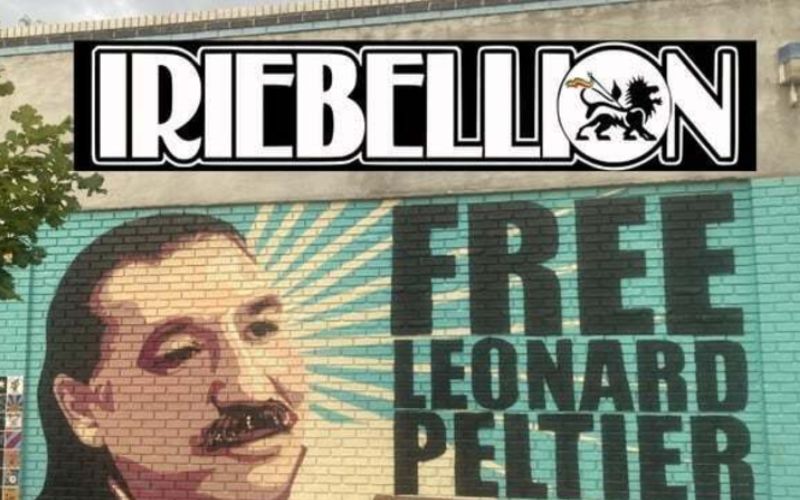
- Details
- By Native News Online Staff
Six-piece reggae band IrieBellion, based in Taos, New Mexico, has released a new single to advocate for the release of Leonard Peltier, a Native American activist who has been imprisoned for nearly 50 years.
“Leonard Peltier’s Song” features Grammy-winning flutist Robert Mirabal of Taos Pueblo and a traditional drum group composed of singers from several Indigenous nations. Through this collaboration, the band hopes to amplify calls for President Joe Biden to grant clemency to Peltier.
The song blends IrieBellion’s reggae-inspired rhythms with Robert Mirabal’s signature flute playing and the traditional Indigenous drumming and singing of John Swiftbird (Lakota), Chaske Pacheco (Dakota/Santa Domingo Pueblo), and Bryson Sanchez (Dakota/San Felipe Pueblo).
The song makes a direct plea for justice, with Davis crafting a chorus —"Do the right thing, let freedom ring/ It's been so long, let's right this wrong" — that appeals to President Biden to take action and right what the band views as a longstanding wrong.
The musical advocacy for Peltier's case has a rich history in popular music. Robbie Robertson (Mohawk), the legendary guitarist and songwriter of The Band, created a particularly powerful statement with his song "Sacrifice," which incorporated Peltier's own voice through a recorded prison phone call with Robertson. Little Steven (Steven Van Zandt), known for both his work with Bruce Springsteen's E Street Band and his solo career, also contributed to this musical legacy with his own "Leonard Peltier," which, like IrieBellion's new release, used Caribbean rhythms to carry its message of justice.
Peltier, a member of the Turtle Mountain Band of Chippewa Indians, became involved in the American Indian Movement (AIM) in the 1970s, a time of tension between Indigneous communities and the U.S. government.
AIM advocated addressing issues such as police brutality, treaty violations, and systemic inequality affecting Native Americans.
Peltier’s case comes from a 1975 shootout on the Pine Ridge Reservation in South Dakota, where two FBI agents and a young Native man were killed. The shootout occurred during a period of violence on the reservation, often referred to as the “Reign of Terror,” when residents faced threats and attacks for their ties to AIM.
Peltier was convicted in 1977 of killing the agents, but his trial has been widely criticized. Key evidence was withheld by the prosecution, including ballistics reports that could have supported his defense.
Eyewitness testimony used to extradite Peltier from Canada was later recanted, with the witness stating they were coerced by the FBI. Even the U.S. attorney who handled the case has since admitted that no one knows who fired the fatal shots.
Peltier has maintained his innocence for nearly five decades, and his case has been condemned by numerous human rights organizations, including Amnesty International. Calls for his release have grown in recent years, with Peltier now in his late seventies and facing health challenges.
“Leonard Peltier’s Song” is available on streaming platforms, including Spotify and Apple Music, and can also be found on IrieBellion’s HearNow page. The band encourages listeners to not only enjoy the song but also take action by learning about Peltier’s case, signing petitions, and contacting officials to advocate for his release.
For those who want to learn more, organizations such as the International Leonard Peltier Defense Committee provide resources and updates on efforts to secure his freedom.
More Stories Like This
AMC Announces Return of Dark Winds for Season 4, Premiering February 15Film featuring Teyton Colbert to hit theaters in November
Tlingit Hunter and Artisan Heather Douville Shares Cultural Traditions in New MeatEater Series “Our Way of Life”
What Inspires Indigenous Ballet Dancer Jock Soto
Grand Rapids Public Museum Hosts Indigenous Culture Celebrations
Help us tell the stories that could save Native languages and food traditions
At a critical moment for Indian Country, Native News Online is embarking on our most ambitious reporting project yet: "Cultivating Culture," a three-year investigation into two forces shaping Native community survival—food sovereignty and language revitalization.
The devastating impact of COVID-19 accelerated the loss of Native elders and with them, irreplaceable cultural knowledge. Yet across tribal communities, innovative leaders are fighting back, reclaiming traditional food systems and breathing new life into Native languages. These aren't just cultural preservation efforts—they're powerful pathways to community health, healing, and resilience.
Our dedicated reporting team will spend three years documenting these stories through on-the-ground reporting in 18 tribal communities, producing over 200 in-depth stories, 18 podcast episodes, and multimedia content that amplifies Indigenous voices. We'll show policymakers, funders, and allies how cultural restoration directly impacts physical and mental wellness while celebrating successful models of sovereignty and self-determination.
This isn't corporate media parachuting into Indian Country for a quick story. This is sustained, relationship-based journalism by Native reporters who understand these communities. It's "Warrior Journalism"—fearless reporting that serves the 5.5 million readers who depend on us for news that mainstream media often ignores.
We need your help right now. While we've secured partial funding, we're still $450,000 short of our three-year budget. Our immediate goal is $25,000 this month to keep this critical work moving forward—funding reporter salaries, travel to remote communities, photography, and the deep reporting these stories deserve.
Every dollar directly supports Indigenous journalists telling Indigenous stories. Whether it's $5 or $50, your contribution ensures these vital narratives of resilience, innovation, and hope don't disappear into silence.
 The stakes couldn't be higher. Native languages are being lost at an alarming rate. Food insecurity plagues many tribal communities. But solutions are emerging, and these stories need to be told.
The stakes couldn't be higher. Native languages are being lost at an alarming rate. Food insecurity plagues many tribal communities. But solutions are emerging, and these stories need to be told.
Support independent Native journalism. Fund the stories that matter.
Levi Rickert (Potawatomi), Editor & Publisher

